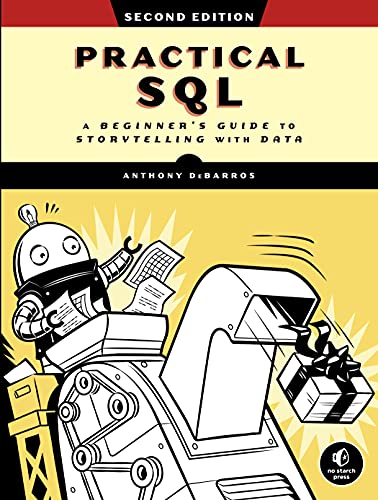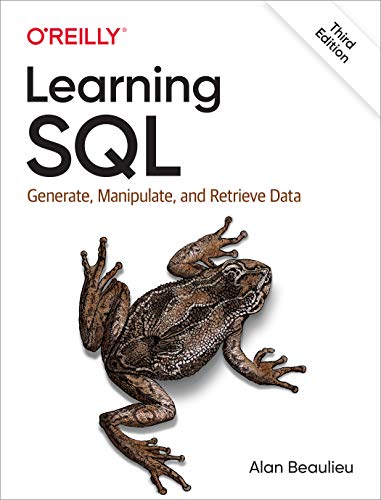9 Relational Databases Books That Will Sharpen Your Skills
Recommended by Anthony Derosa, Bill Karwin, and C. J. Date, these Relational Databases books offer trusted insights for developers and analysts.

What if the key to unlocking powerful data insights was hidden in plain sight within relational databases? As organizations grapple with ever-growing data volumes, mastering relational databases remains essential for turning raw information into actionable knowledge.
Anthony Derosa, U.S. News Editor at The Wall Street Journal, has relied on SQL's storytelling potential to illuminate economic and census data narratives. Alongside experts like Bill Karwin, who demystifies common SQL pitfalls, and C. J. Date, a pioneer in relational theory, these voices highlight books that blend practical skills with foundational concepts.
While these expert-curated books provide proven frameworks, readers seeking content tailored to their specific experience levels, programming languages, or project goals might consider creating a personalized Relational Databases book that builds on these insights.
Recommended by Anthony Derosa
U.S. News Editor at The Wall Street Journal
“Anthony is a fantastic teacher, I can attest to this! Go get his book:” (from X)
by Anthony DeBarros··You?
by Anthony DeBarros··You?
When Anthony DeBarros first discovered the power of SQL beyond simple queries, he realized it could unlock stories hidden in complex data. Drawing from his background as a journalist and data analyst, he crafts a guide that teaches you how to navigate relational databases using SQL with real datasets like US Census demographics and NYC taxi rides. You'll learn to create databases, clean data, perform advanced statistical operations, and even analyze spatial data with PostGIS. This book suits anyone from beginners to those wanting practical skills for telling data-driven stories, though those seeking deep theoretical database design might look elsewhere.
When Bill Karwin first realized how often developers stumbled over common SQL mistakes, he set out to catalog them for the benefit of programmers at all levels. Drawing from over two decades of experience working with relational databases and open source projects like Zend Framework and InterBase, Karwin identifies specific antipatterns such as "Index Shotgun" and "Spaghetti Query" that frequently degrade database performance and maintainability. You’ll learn how to recognize these pitfalls across logical and physical database design, query writing, and application integration, with clear guidance on how to correct and avoid them. This book suits anyone from junior developers to experienced engineers seeking to write more reliable, efficient SQL code and build stronger databases.
by TailoredRead AI·
This personalized book provides a tailored approach to foundational relational database design, focusing on core principles and practical techniques adapted to your background and goals. It offers a structured exploration of relational theory, normalization, schema design, and data integrity, cutting through generic advice to fit your specific context. The book emphasizes creating robust, scalable database architectures through a personalized framework that integrates essential concepts with your unique project requirements. By addressing both theoretical foundations and hands-on implementation strategies, it equips you with a solid blueprint for designing effective relational databases that align precisely with your technical environment and objectives.
by Michael J Hernandez··You?
by Michael J Hernandez··You?
Michael J. Hernandez's 25th Anniversary Edition of this book sprang from his extensive 25-year journey as a database consultant and educator. You’ll learn how to design relational databases that are not only robust and reliable but flexible enough for modern applications, from defining tables and keys to establishing business rules and data integrity. The book walks you through practical techniques like performing user interviews and analyzing existing databases, complete with updated review questions to solidify your grasp. If you're new to database design or looking to improve an existing system, this guide offers clear, jargon-free instruction tailored to help you build sound, trustworthy databases.
by Miguel Grinberg··You?
When Miguel Grinberg first discovered the power of SQLAlchemy 2.0, he set out to create a practical guide that takes Python developers through building a relational database from the ground up. You’ll learn how to develop a complete project—a retro computer online store—including product catalogs, order systems, reviews with star ratings, and analytics without third-party tools. The book also dives into integrating databases with Flask and FastAPI, plus asynchronous programming with asyncio. If you want hands-on experience writing real queries and managing relational data in Python, this book walks you through it clearly and methodically.
by Alan Beaulieu··You?
by Alan Beaulieu··You?
Alan Beaulieu's approach in this book shifted previous assumptions about learning SQL by focusing on practical application rather than abstract theory. You get hands-on lessons covering everything from basic SQL data manipulation to advanced features like analytic functions and handling very large datasets, including new chapters on SQL in big data contexts. The book walks you through creating tables, indexes, and constraints, plus working with subqueries and built-in functions, so you can handle real database tasks confidently. If you're a developer or analyst aiming to deepen your command of relational databases, this book delivers clear, example-driven instruction without unnecessary complexity.
This personalized SQL learning plan offers a structured 30-day approach focusing on practical skills essential for project success. It provides a tailored framework that prioritizes key SQL concepts, query optimization, and database design aligned with your specific project needs and background. The book cuts through generic advice by delivering step-by-step lessons and real-world examples relevant to your industry and goals. Readers gain actionable strategies for mastering data retrieval, manipulation, and schema development with a focus on rapid skill acquisition. This tailored approach ensures efficient learning and direct application, fitting your unique context and accelerating your SQL proficiency effectively.
by Allen G. Taylor··You?
by Allen G. Taylor··You?
When Allen G. Taylor first discovered how many misconceptions surround SQL, he aimed to make it accessible without oversimplifying. This book walks you through creating, accessing, and managing relational databases with clear explanations of SQL's core language and latest features like temporal data handling. You'll learn practical techniques for structuring databases, securing your data, and avoiding common errors, all illustrated with examples from popular systems like Oracle and MySQL. If you're new to database development or want a friendly refresher, this book offers straightforward guidance without assuming prior expertise.
by Larry Rockoff··You?
by Larry Rockoff··You?
Drawing from his deep expertise in SQL programming, Larry Rockoff crafted this book to fill a gap he saw in beginner-friendly SQL resources. Instead of overwhelming you with syntax dumps, he breaks down SQL concepts clearly and builds your understanding step-by-step, covering Microsoft SQL Server, MySQL, and Oracle. You’ll learn how to retrieve and manipulate data, design intuitive relational databases, and handle advanced topics like joins, subqueries, and stored procedures—all without needing to run code as you read. If you're new to SQL or want a straightforward introduction that respects your learning pace, this book fits well, though experienced developers might find it foundational rather than advanced.
by Ralf Adams··You?
by Ralf Adams··You?
What changed my perspective reading this was how Ralf Adams moves beyond the usual jargon-heavy introductions to SQL and database design. Drawing from his extensive teaching experience, Adams lays out foundational concepts like ER models, keys, and normalization with clarity, then guides you through practical applications using MySQL, PostgreSQL, and T-SQL examples. You’ll find chapters that build your skills through exercises and real-world scripts, including database administration and distribution across servers. If you want a hands-on grasp of SQL that balances theory with tested practice, this book suits you well; it’s less for those seeking advanced database theory and more for learners wanting a solid, applicable base.
Unlike most database design books that skim theory, C. J. Date dives deep into the scientific foundations of relational database design, making complex concepts like advanced normal forms approachable for practitioners. You’ll gain clarity on crucial ideas such as essential tuple normal form and domain key normal form, with examples refined from decades of teaching experience. The book bridges the gap between abstract theory and practical design, helping you create database models that remain robust despite evolving business needs. If you’re involved in database design or administration, this text offers a rigorous framework to elevate your understanding beyond surface-level techniques.
Get Your Personal Relational Databases Guide Fast ✨
Stop wading through generic advice. Get targeted strategies tailored to your needs in minutes.
Join 15,000+ Relational Databases enthusiasts who've personalized their approach
Conclusion
Across these nine books, clear themes emerge: practical application alongside strong theoretical foundations, attention to common challenges like antipatterns, and adapting relational databases to modern programming environments.
If you're just starting, Database Design for Mere Mortals offers a solid foundation. For those wanting to avoid common SQL errors, SQL Antipatterns provides actionable guidance. Developers working in Python should combine SQLAlchemy 2 In Practice with Learning SQL for a focused skill set.
Once you’ve absorbed these expert insights, create a personalized Relational Databases book to bridge the gap between general principles and your specific situation. Tailored knowledge can accelerate your journey from understanding relational theory to building robust, efficient databases that serve your unique needs.
Frequently Asked Questions
I'm overwhelmed by choice – which book should I start with?
Start with "Database Design for Mere Mortals" for a clear, step-by-step introduction to database design. It lays a strong foundation before diving into SQL specifics.
Are these books too advanced for someone new to Relational Databases?
Not at all. Books like "SQL for Dummies" and "Language of SQL, The" cater specifically to beginners with approachable explanations and examples.
What's the best order to read these books?
Begin with design basics from Hernandez’s book, then progress to SQL fundamentals with Beaulieu or Taylor, and follow up with Karwin’s "SQL Antipatterns" to avoid common mistakes.
Do I really need to read all of these, or can I just pick one?
You can pick based on your goals. For practical querying, "Practical SQL, 2nd Edition" is excellent; for theory, Date’s book is unmatched. Combining a few offers broader insight.
Are any of these books outdated given how fast Relational Databases changes?
These books cover enduring principles and widely used SQL practices. While technology evolves, foundational theory and core SQL concepts remain relevant across platforms.
Can personalized books help me learn more efficiently?
Yes! While expert books offer broad insights, personalized Relational Databases books tailor content to your background, skills, and goals, making learning faster and more relevant.
📚 Love this book list?
Help fellow book lovers discover great books, share this curated list with others!
Related Articles You May Like
Explore more curated book recommendations








